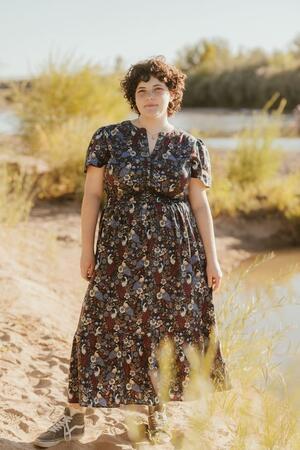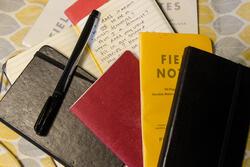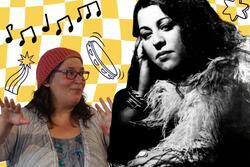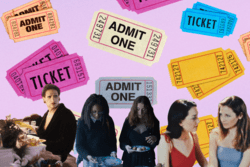Where Are They Now? RVF Alum Judy Ruden
JWA talks to Rising Voices Fellowship (RVF) alum Judy Ruden, an incoming first-year student at University of Texas-Austin, for the final installment of our series marking the tenth anniversary of the fellowship. See here for the complete series.
JWA: Tell us about your experience participating in the tenth cohort of the Rising Voices Fellowship in 2022-2023.
Judy Ruden: My experience as a fellow in RVF's 2022-2023 cohort remains unforgettable. Meeting numerous talented young Jewish feminists, I cultivated a voice in writing that has influenced many aspects of my life today. The webinars, blog posts, and retreats were all impactful in their own ways. Having a platform on which you are encouraged to voice your perspectives seems like a fleeting opportunity for many young adults today, and I'm glad my fellows and I were given that chance. We all connected deeply and found community through complex discussions concerning topics ranging from public policy to the best Frank Ocean songs.
JWA: What were the impacts of RVF on your high school self?
JR: I participated in RVF during my junior year of high school. Now, as a senior, I feel like I broadened my horizons significantly and I'll finish high school as a more well-rounded individual because of it. My school has a very small and very homogenous Jewish population. RVF provided me with opportunities to connect with others who identified with Judaism and feminism differently than I or those around me did. Many of the stories I heard and lessons I learned through the fellowship were incorporated into the plans I made with my school's Jewish Student Union as well as relevant school projects. Overall, I learned how to approach new and unfamiliar concepts with patience and radical acceptance, which is a skill that I believe was refined through my experience as a fellow.
JWA: How has RVF continued to influence you as an adult?
JR: Though I've only legally been an adult for eight months, RVF serves as a constant reminder of the urgency with which one should participate in politics. My cohort convened in a post-Roe world, and the necessity of political action was constantly looming overhead. I appreciated the candor with which these subjects were broached, and how we were always encouraged to ask questions and voice opinions without feeling censored. I voted for the first time this past November, and I plan to continue to continue engaging with the political process. RVF encouraged me to take responsibility for my personal politics and belief systems, giving me the confidence to step into adulthood with a passion for prompting change.
JWA: Reflecting on your high school experience, what experiences were most meaningful to you as a Jewish feminist?
JR: Initially, I didn't realize the depth of exploration possible concerning the intersection between Judaism and feminism. I spent much of my time between my bat mitzvah and my fellowship chalking up historical women's experiences in Judaism as another subset of Jewish learning. The radicality of feminism and the subdued nature of the Judaism I grew up with seemed incompatible. Having the opportunity to research important figures in Jewish feminism and delve into their personal histories brought me a sense of connection and pride I had seldom felt concerning my Jewishness. JWA opened the floodgates of Jewish feminist knowledge, and it is a gift I will treasure for a long time.
JWA: What are you looking forward to about college?
JR: I'm eagerly anticipating the opportunity to immerse myself in learning at UT Austin! In college, I hope to study topics that spark curiosity and incorporate different disciplines in innovative ways. Going to such a big school is nerve-wracking, but I'm excited to forge a community of young Jewish students and participate in Judaism in new ways. I am eager to be in such a radical space and to have the opportunity to learn about my own interests in a more independent setting. Mostly, I'm looking forward to participating in more Jewish feminist projects inspired by the amazing initiatives I witnessed among members of my RVF cohort across the country.
JWA: What advice do you have for young people discovering their Jewish and feminist identities?
JR: I applied to RVF on a whim, and I would, at times, find myself feeling lost in the conversation, worried that I would say the wrong thing, or that my knowledge wasn't sufficient. This learning curve was intimidating, especially coming from a place with relatively few Jewish people. The impostor syndrome was palpable, and I found I learned most when I sat back and listened to others' perspectives instead of constantly vying for a chance to speak. With this in mind, my advice to young people embarking on this journey would be to embrace the unknown and trust your knowledge. Stay curious, and don't let your fear of being seen as "uninformed" preclude your intellectual endeavors.
This piece was written as part of JWA’s Rising Voices Fellowship.







